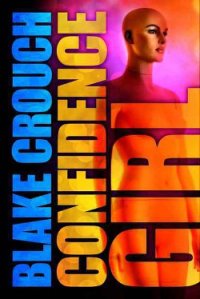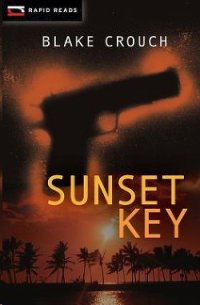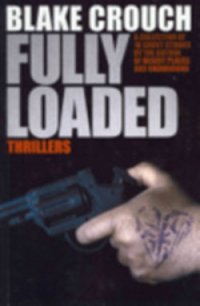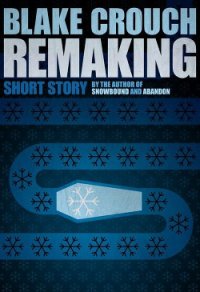Grab - Crouch Blake (читаем книги TXT) 📗
"That's all?"
She stared at the Thriller-era Michael Jackson bobblehead on her substance abuse counselor's desk and said, "Christian, will it make you feel better if I say I'm scared?"
"Only if it's the truth."
"Of course I'm scared."
"Afraid you'll use again?"
"Sure."
"But you know how to fight it now. You're empowered. You know your triggers—external and internal. You know your three steps to ensure sobriety."
"Recognize. Avoid. Cope."
"There you go. And what's your main trigger?"
"Breathing."
"Come on."
"Remembering what a complete failure I am."
"That's not true."
"Convicted felon."
"Letty."
"Meth addict."
"Stop."
"Junkie whore."
"This is counter—"
"And let's not forget—you got mother of the year sitting on your couch. Christian, I got triggers everywhere I look."
Christian leaned back in his chair and sighed the way he always did when Letty turned the knife on herself. He was old-school Hollywood handsome. Cary Grant. Gregory Peck. With his short-sleeved button-down and clip-on tie, he looked like a car salesman. But his eyes implied trust. Kind and wise and sad.
How could they be anything but? Talking all day to losers like me.
"You know if you don't make some kind of peace with yourself, Letty, none of this stuff works."
On the wall beside Christian's desk, she let her eyes fall upon a painting between two framed diplomas. She inevitably found herself staring at it during some point of each weekly session. It was a print of a Romantic masterpiece—a man standing in a dark frockcoat on the edge of a cliff. His back is to the viewer, and he's gazing out over a barren, fog-swept waste. The landscape looks so hostile and unforgiving it could be another planet.
Christian turned in his swivel chair and glanced up at the wall.
"You like that painting."
"What's it called?"
"Wanderer Above the Sea of Fog."
"Nice."
"What do you like about it?"
"I like the man's fear."
"Why do you say he's afraid? You can't even see his face. I think he's exhilarated."
"No, he's afraid. We all are, and this painting says that. It says we're not alone."
"You're not alone, Letty. If you'd take my advice and join a group, you'd see that."
"NA isn't for me."
"Sobriety is a group effort."
"Christian, the only time I never used was when I was working. When I had a job."
"You mean stealing."
"Yeah."
"You still messing around with that?"
She smiled. "You know what they say. You can take the girl out of prison..."
"That's just another form of addiction, Letty."
"I get that."
"So what are you saying?"
"I want to stay clean. For me. For my son. But I don't see the world like you do."
"What do you see?"
Her lips curled up into something that could almost be called a smile. She pointed at the painting.
3
Letty left town that evening with her entire life, such as it was, in a suitcase.
Clothes.
A framed photograph of Jacob at four years old smiling from the top of a slide.
Laptop.
Phone.
And 5K in cash.
With a thermos full of French roast, she drove all night.
Slept at a truck stop in Arkansas the next day.
She got off the interstate where she could and stuck to back roads. Something more therapeutic in driving her Honda Civic beater down a two-lane highway than anything she'd experienced in rehab. A tangible sense of the life before falling behind her like so many stripes of faded yellow.
She didn't push herself. Some days she only clocked a hundred miles. Oregon was the final destination, but she made no effort to take a direct course. She meandered, and in the beginning, didn't think about a thing. Just let the landscape scroll. Whole chunks of time when her mind was a bright blue cloudless sky. Where she was so completely out of herself that when she snapped back into the moment, she couldn't even remember driving. She'd be in a new state. On a different road. She wanted more time to pass like that. She lived so rarely in the present, her existence neatly boiled down into two equal parts.
The depression and regret of her past.
The fear of what was to come.
Her two plains of consciousness.
And it was driving on the plains of eastern Nebraska on a late summer afternoon when something like an epiphany struck her. She would always remember the moment, because out the windshield her stretch of prairie was sundrenched and golden with late light.
When I'm high and when I'm on a job—I'm not plagued by the sadness of the past and the fear of the future.
That's why I use.
Why I steal.
Those are the only times when I live in the moment like a free human being.
# # #
She checked into a motel on the eastern desert of New Mexico on her fifth or sixth day. It was after ten p.m. and in the west the sky was getting raked by an electrical storm that was too far out for the sound of its thunder to reach her.
She pulled a chair out onto the concrete balcony.
Sat watching the sky light up, thinking how nice it would be to get high. It wasn't much of a desert town, but she'd driven past a roadhouse on the outskirts. She could take a shower, put on something slinky, head down there and score. She could almost taste the smoke. Gasoline and plastic and household cleaners and Sharpies and sometimes apples. Oh yes, and nail polish. She hadn't dared to paint her toes in the last six months for fear the odor alone would set her down the bad path.
Challenge the thought to use.
You do it tonight, when you start to come down you'll feel so bad you'll have to go again. And again. Cycle repeats. Then you'll have lived in this motel room for three weeks and eaten nothing but convenience store food. You'll be frail and sick, right back where you were last fall.
But the urge was still there.
So how do you cope?
If she went back into the room, she knew what would happen. She'd take a shower under the guise of distracting herself. But then she'd get out, suitcase dive for something sexy, and head down to the bar.
So how do you cope?
Stay right where you are.
Do not move.
By midnight, she could hear the thunder and smell the threat of rain in the sky like a closed-up attic. She didn't go inside. Not even when the rain started.
It came down in curtains. The temperature fell. Almost instantly there were pools of standing water in the empty parking lot. The lightning touched the desert a quarter mile away, and the ensuing noise was louder than a shotgun blast at close range.
Still, she didn't move.
Her clothes were drenched and she was shivering.
The storm passed.
Stars appeared.
She could hear the quiet roar of I-40 a mile away.
It was 3:30 in the morning.
Struggling to her feet, she pulled open the sliding glass door and walked into the frigid air-conditioning. She stripped out of her wet clothes and climbed naked into bed. The need was still there, just no longer screaming in her face. Now she pictured it as the embodiment of an emaciated woman, crouched in a corner, whispering madly to herself.
4
She stopped the next afternoon in the red desert waste of Arizona. It had been twenty-four hours since she'd eaten, something in the ache of an empty stomach that she found useful in fighting the urge to use. If hunger was on her mind, crystal meth wasn't.




